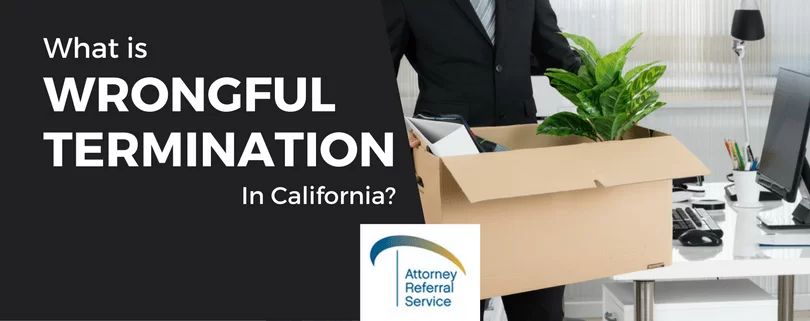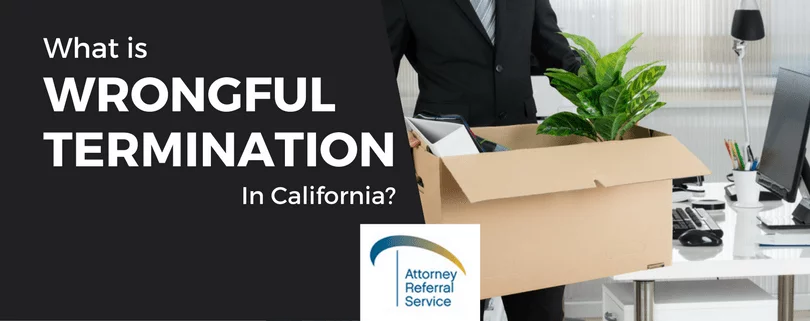What Is Wrongful Termination in California Anyway?
What is wrongful termination in California anyway? Today, we’re exploring what the state considers wrongful termination so you’re informed and prepared.
Like many other states, California is an at-will state, meaning employers can discipline or fire workers any time (at will) without providing a reason to the worker. Workers do not have contracts, and employers are not obligated to keep them employed.
However, there are situations where the firing of an employee could be considered wrongful termination. Terminating an employee for an unlawful reason is wrongful termination.
Wrongful termination occurs whenever an employer terminates an employee for any one of many protected characteristics covered by California’s Fair Employment and Housing Act (FEHA).
Here are some of the ways wrongful termination can occur.
Discrimination
Federal law prohibits an employer from firing an employee based on a protected characteristic including race, color, national origin, sexual orientation, pregnancy, religion, age (at least 40), disability, genetic information, citizenship status, marital status, AIDS or HIV status, medical condition, military and veteran status, political activities or affiliations, or status as a victim of domestic violence, sexual assault, or stalking.
This would be considered discrimination.
It is also illegal for an employer to retaliate against employees for asserting their rights. If you feel you are passed over for a promotion because of your age, and you complain to your HR department, your employer may not discipline or fire you for making that complaint.
Similarly, your employer cannot discipline or fire you for participating in any investigation of a discrimination complaint, testifying in court, or trying to change or stop discriminatory practices.
Breach of contract
While most employees have at-will employment, some have contracts that promise job security for a period of time and promise not to fire them without good cause. The contract can be written, oral or implied.
In an implied contract, the employer doesn’t make promises but acts in a way that leads to a reasonable expectation by the employee that he will remain employed.
Sometimes an employee handbook or set of corporate policies will include information on discipline and outline the steps to be followed before an employee may be terminated. If an employee is fired without these steps being followed, he may have a case for wrongful termination under breach of contract.
Wage and hour laws
California employees are entitled to a minimum wage along with the right to overtime pay when they work more than eight hours a day, 40 hours a week, or seven workdays in a row. They are entitled to overtime pay of time-and-a-half or double time depending on the number of hours worked.
There are many other laws covering meal breaks and rest breaks designed for the health and safety of workers. Employers may not terminate employees for their complaints about their company’s failure to follow wage and hour laws.
Time off and protected leaves
Federal and California state laws allow employees the right to take time off for certain family and civic responsibilities. Employers may not fire or discipline their employees for exercising these rights. They include the following:
Family and medical leave
Federal and California state laws protect employees when taking care of family and medical issues. The federal law is the Family & Medical Leave Act (FMLA). California has a similar law but includes a domestic partner in the definition of “family member.” Employees who take the FMLA leave are entitled to return to their previous position following the leave.
Military leave
Federal law gives employees the right to take up to five years of leave to serve in the military and be reinstated when they return to work. The law protects employees from discharge without good cause for up to one year after they return from duty, and it protects them from discrimination based on their military service.
Civic duties: voting and jury time
California allows up to two hours of paid time off to cast their ballots. While this time may be taken at the beginning or end of the employee’s shift, it may not be taken if there is sufficient time to vote during non-work hours.
California also allows employees unpaid leave for jury service. Employers may not penalize employees for jury service or they may face wrongful termination penalties as well as criminal sanctions.
Pregnancy disability leave
California employers with at least five employees must provide those eligible with up to four months disability leave for pregnancy. This is given in addition to time off provided under the family and medical leave laws. A California employee can take four months off for pregnancy leave and another 12 weeks for nurturing and bonding.
Other protected leaves
There are other areas of protected leave in California including giving eligible employees up to 10 days of unpaid leave to visit with a spouse who is on leave from active military duty.
California also provides time off for participation in a child’s school or daycare activities, for violence or domestic abuse, alcohol or drug rehabilitation, bone marrow or organ donor leave. Employers in California may not terminate an employee for taking advantage of these protected leaves.
Workplace issues
There are various workplace issues which can also affect wrongful termination. These include worker’s compensation and workplace safety. Employers may not fire an employee for filing a worker’s compensation claim. And an employer cannot terminate an employee for complaining about health or safety conditions in the workplace.
If an employee feels that a federal, state or local law is being violated in the workplace, and she discloses that violation to a government agency, her employer may not retaliate against her. This is known as whistleblowing protection.
If an employee feels she can no longer remain at work because of intolerable conditions such as constant harassment for gender or sexual orientation or physical disability and resigns her job, this is considered “constructive termination.”
Constructive termination is considered the same as involuntary termination and is a cause for a wrongful termination suit.
How to file a wrongful termination claim
If you think you were wrongfully fired, you should consult with an employment lawyer for advice. An attorney is familiar with local, state and federal laws as they apply to wrongful termination claims. The attorney can help you with options for getting your job back, negotiating a strong severance package, or going to court.
Before filing a lawsuit, you must file a complaint with the appropriate government agency. In California, you can file a complaint with the California Department of Fair Employment and Housing. You can file at the Department’s offices in Elk Groveor you can file online. You may also have to file with Equal Employment Opportunity Commission (EEOC). An employment lawyer will make sure your case is filed with the agencies that give you the protection you deserve.
Are you in search for a certified attorney to represent you?
Let us help you find one today!



